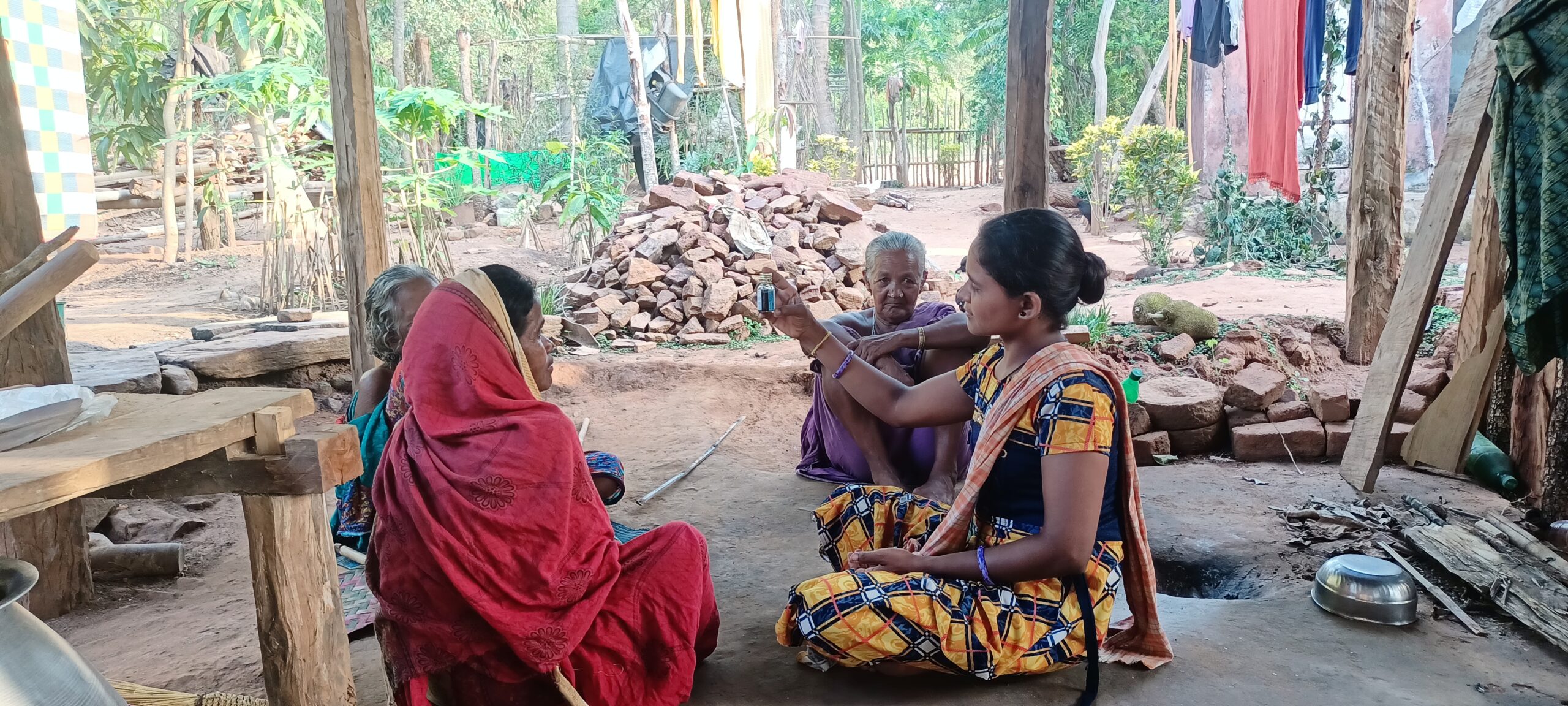An Adivasi village learns to monitor water quality
StoryBy Chandrika Patnaik
22 March 2023
Adivasi families learn water quality management to ensure safe drinking water for their communities.

Sanju Jani shows the result of the bacteria test.
Photograph by Prasanta Kumar Naik
Biluamara village falls under Jagannathprasad block in Ganjam district. It is home to 35 Adivasi families. In 2006, each household in the village received a piped-water supply for the toilet, bathroom, and kitchen. This arrangement worked well for village women who spent hours fetching water daily. However, the village saw a sudden spurt in water-borne diseases among children and adults.
The village has a “water quality cadre” responsible for monitoring the water quality and facilitating the rectifcation of issues found with support from Village Development Committees. Sanju Jani, 26, the water quality cadre in question, lives with her parents and two brothers in Biluamara village. Sanju has passed Class 12 and works with the Van Suraksha Samiti. As a Poshan Mitra, she is responsible for testing the quality of all drinking water sources that the village accesses.
Sanju took on the challenge despite being unsure at first. She says, “Although I own a smartphone, I was not comfortable filling out online forms and uploading information to the mWater app. Due to my lack of technology expertise, I was unsure how to handle the role.”
Water Quality Management involves several aspects such as testing water samples collected from water sources using Field Testing Kits (FTKs), uploading the results of water tests and sanitary surveys to the mWater app, share the test results with the community and facilitate the rectification of issues (if found) with support from VDC.
In April 2022, Sanju received the training on the above aspects for water quality management. She happens to be one of the 84 volunteers in the Ganjam district of Odisha, among whom 24 are women. In training, she learnt about the testing protocol and using field testing kits (FTKs) to test water quality from the source, main pipeline, and household. Soon after taking up the role, she started with the water testing work in Biluamara. The sample water collected and tested revealed bacteria contamination.
Soon a sanitary survey took place in Biluamara. It revealed damage in the pipeline which was suspected to be the cause of water contamination. Sanju then organised a meeting on awareness of water quality management based on the survey results. While the community learnt about the health risks of contaminated water and water-borne diseases, Sanju convinced the Village Development Committee members to repair the pipeline. Several meetings were held to make the village residents aware of water quality and hygiene practices. Sanju persuaded all the 35 families residing in the village to contribute to repairing the damaged pipeline and cleaning the overhead water tank. The community was also asked to get the water tank cleaned at least once in every quarter.
“We were able to solve the water contamination problem in our village. At first, we did not believe Sanju when she spoke to us about the contamination of the drinking water with bacteria. However, with the water pipeline repair, the problem is now completely solved,” says Bijay Jani, 55, a farmer and a village committee member of Biluamara village.
The solid waste segregation at the household level.
Photograph by Prasanta Kumar Naik
ACKNOWLEDGEMENT
Baccha Panna, Thematic Coordinator in Sanitation and Health, and Prasanta Kumar Naik, a Thematic Coordinator in Planning Monitoring Documentation and Communication, helped with data collection for the story. Mark Lancy Sebastian edited the story.
ABOUT THE AUTHOR
Chandrika Patnaik leads content production within the Communications team in Gram Vikas.
RELATED BLOGPOSTS
Water ushers in a new dawn in the life of Raidih’s farmers
Raidih’s farmers embrace sustainable agriculture and irrigation advancements, heralding a prosperous, water-efficient era in farming.
Gajendra Sahu’s kitchen dreams find wings in his village Adri
Gajendra Sahu transforms his culinary skills into a thriving village enterprise, inspiring Adri’s youth.
From one farmer’s soil to another: how Lochan’s journey in Odisha can inspire us all
Discover how pointed gourd farming reshaped the future for a small-scale farmer in Odisha.